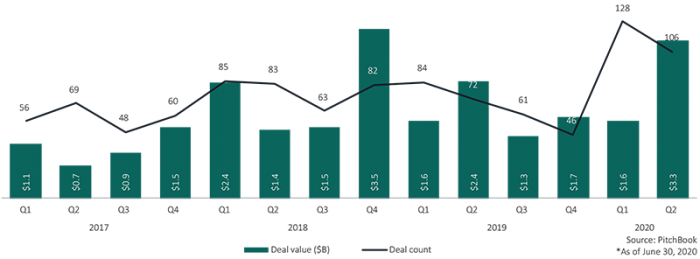Finistere reports on foodtech and agribusiness investment trends
Investment in foodtech reached $4.8 billion in the first two quarters, more than half the capital raised in the whole of 2019, the highest year on record

Finistere Ventures has reported on recent investment trends in foodtech and agribusiness, revealing that investment across these sectors totalled $2.2 billion for the first two quarters of 2020, in contrast to $2.7 billion being raised in the whole of 2019, which was the highest year of funding on record.
In foodtech, first and second-quarter investment was $4.8 billion, compared to a total of $7 billion in 2019.
Finistere is a venture capital firm with a sharp focus on agrifood and foodtech companies. It operates from offices in the US, Ireland and New Zealand.
The company revealed that feedback from meetings with fellow venture capital firms indicate that funds with significant unspent capital have been pushing back dates by which funding rounds must close out to the end of 2021 and beyond, so to give their portfolio companies more time to take off.
This view is borne out by a review of deals showing that the majority of transactions were led by existing investors, notwithstanding many follower investors joined onto these rounds.
According to Finistere, in addition to helping start-ups push their funding needs outside the ‘Covid-19 zone’, the postponement of funding enables companies to build more evidence of their value, particularly for planned Series B and later rounds where growth investors look for signals of scalability.
Finistere also reported that planned rounds in diligence accelerated as pragmatic start-up leaders, and their current investors, pushed to close additional capital for the same reasons.
The company expected that new investor-led rounds have been a lesser part of the total, a trend likely to continue while capital managers take stock of the market conditions. Finistere also expects valuations to be under pressure looking forward.

The company explained that valuations tend to be ‘sticky’ so it will probably require a year or more for the true impact of Covid-19 to manifest in this metric. However, Finistere added that it saw a clear delineation by stage impact.
While pre-money valuations in early-stage investments across agrifood have decreased, valuations for late-stage financings have remained strong despite the current pandemic.
Beyond 2020
The outlook for 2021 remains turbulent. Foodtech and agribusiness start-ups are likely to find funding future growth more challenging, but Finistere believes there are some promising tailwinds set to benefit the foodtech sector.
Some start-ups have been benefitting from the move to dining-at-home, with both meal solutions and e-commerce grocery pushing revenue growth.
Finistere explained: “The best-in-class companies from our portfolio, such as Good Eggs, Farmer’s Fridge and recent addition Tovala, are seeing strong metrics in this respect and improving customer acquisition.”
The venture capital company believes that there will be lasting and persistent changes to consumer behaviour in at-home consumption, and noted this is the first year since 1994 that restaurant share of food consumption dropped versus in-home.
“Retaining these customers and growing margins will be key to future funding rounds, but the trend looks promising for this cohort,” the company said.
The budding alternative protein sector has proven to be a fertile ground for investments over the past three years, luring fresh capital with mega-rounds like those of Memphis Meats and Perfect Day underlining investor appetite for the novel protein sector.
Finistere believes, however, this segment will likely need deep-pocketed support and patient money to succeed. Product development in this category faces deep technical challenges and robust investment is required to build operating facilities, marketing and channels for go to market.
Looking ahead, Finistere expects to see the influx of capital seen in Q2 continue but insisted that the new normal is still being written.




